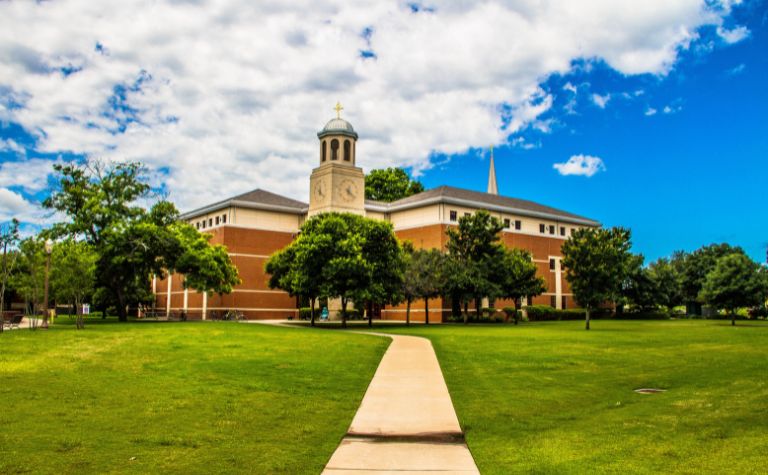When it comes to advanced studies in theology and ministry, the term “seminary” often comes up.
However, not all seminaries are the same, and this is particularly evident when comparing Christian seminaries with LDS (Latter-day Saints) seminaries.
While both serve as educational platforms for those interested in theology, their structure, curriculum, and overall goals can differ significantly.

Differences Between Christian and Mormon Seminary
The word “seminary” originates from the Latin “seminarium,” meaning “seed plot” or “plant nursery.” This term was derived from “semen” or “seminis,” which means “seed.”
Over time, “seminary” evolved to describe an institution for training priests, reflecting the idea of nurturing spiritual growth.
| Christian Seminary | LDS Seminary | |
|---|---|---|
| Age Group | Adults, usually 22+ | Youth, ages 14-18 |
| Educational Level | Graduate | High School |
| Duration | 2-4 years | 4 years |
| Curriculum | Advanced theological studies, ministry training | Basic LDS doctrines, scriptures |
| Degree Offered | e.g., Master’s of Divinity, Doctorate | None |
| Accreditation | Often accredited by ATS or regional bodies | Not accredited |
| Admission Requirements | Bachelor’s degree, application | Enrollment in high school |
| Financial Aid | Scholarships, grants, work-study | Generally free |
| Career Focus | Ministry, counseling, academic research | Not career-focused |
| Campus Life | Campus housing, extracurricular activities | No campus, usually part of a church or near a high school |
| Schedule | Full-time, part-time, online options | Usually early morning or after school |
| Teaching Method | Lectures, seminars, research papers | Teacher-led discussions |
| Practical Experience | Internships, field education | Limited to church activities |
What is a Master of Divinity degree?
A Master of Divinity (M.Div.) is a professional graduate degree for individuals seeking ordination in religious vocations.
Typically spanning three years, it covers theology, biblical studies, pastoral care, and liturgical practices.
Many seminaries and theological schools offer M.Div. programs to prepare students for ministry roles.

Age Group and Educational Level
One of the most noticeable differences between Christian and LDS seminaries is the age group and educational level of the attendees.
Christian seminaries are generally geared toward adults who have completed an undergraduate degree and are looking to pursue advanced studies in theology and ministry.
These institutions offer graduate-level programs, including Master’s and Doctoral degrees.
On the other hand, LDS seminaries primarily cater to high school students.
These programs are often integrated into the student’s regular school schedule and aim to provide foundational knowledge of LDS scriptures and teachings.
Unlike Christian seminaries, LDS seminaries do not offer graduate-level degrees but serve as a preparatory step for those who may later choose to serve missions or take on other roles within the LDS community.

Duration and Schedule
The time commitment for Christian and LDS seminaries varies significantly.
In Christian seminaries, students often enroll in programs that last from two to four years, depending on the degree they are pursuing.
Classes are typically held during weekdays, and students may also be required to complete internships or fieldwork.
The schedule is similar to that of other graduate-level educational programs.
In contrast, LDS seminaries usually align with the high school academic year, running for four years in total.
Classes are often held early in the morning before the regular school day begins or as a part of the school’s elective offerings.
The schedule is designed to be convenient for high school students, allowing them to balance their seminary education with other academic and extracurricular activities.
Curriculum and Teaching Level
In Christian seminaries, the curriculum is comprehensive and covers a wide range of topics, including biblical studies, theology, pastoral care, and ethics.
The teaching methods often involve lectures, seminars, and research projects.
Many programs also require students to gain practical experience through internships or fieldwork.
Advanced degrees may require a thesis or dissertation.
On the other hand, LDS seminaries focus primarily on the study of scriptures, specifically the Book of Mormon, the Old and New Testaments, and other LDS texts.
The teaching methods are generally more interactive, often incorporating group discussions and activities aimed at high school students.
The curriculum is designed to be completed in four years, coinciding with the high school education timeline.
Practical application and personal reflection are emphasized, but there is generally no requirement for internships or fieldwork.
Degree and Accreditation
In Christian seminaries, students often pursue advanced degrees such as a Master of Divinity, Master of Theology, or Doctor of Ministry.
These institutions are usually accredited by recognized educational bodies, ensuring that the degrees are universally accepted and meet certain academic standards.
This accreditation allows for the transfer of credits between institutions and is often a prerequisite for certain career paths.
In contrast, LDS seminaries do not offer degrees. The program is more of an educational supplement to high school studies.
While there is a graduation certificate for completing the four-year course, it is not accredited like Christian seminary degrees.
The focus is more on personal development and scriptural understanding rather than academic accreditation.
Admission Requirements
Applicants generally need to complete an undergraduate degree for entry into a Christian seminary.
Additional requirements may include letters of recommendation, a statement of purpose, and sometimes even prior coursework in specific subjects.
Some seminaries also require interviews or assessments as part of the admission process.
On the other hand, LDS seminaries have a more open admission policy.
Typically, enrollment is open to high school students who are members of the LDS community.
There are no stringent academic prerequisites, and the process is often as simple as registering for the course.
The emphasis is on willingness to participate and engage with the teachings rather than meeting specific academic criteria.
Financial Aid and Costs
Christian seminaries often have a range of tuition fees, depending on the institution and the specific program.
Financial aid options are usually available, including scholarships, grants, and student loans.
Some seminaries also offer work-study programs to help offset costs.
It’s advisable to check with individual institutions for the most current information on tuition and financial aid options.
In contrast, LDS seminaries are generally cost-free for enrolled students.
These programs are often subsidized by the LDS community, making them accessible without imposing a financial burden on families.
However, there may be minimal costs for materials or optional activities.
Overall, the financial aspect of LDS seminaries is less demanding compared to their Christian counterparts.
Career Focus and Practical Experience
In Christian seminaries, the curriculum is often designed to prepare students for specific career paths such as pastoral leadership, counseling, or academia.
Practical experience is a key component, with many programs requiring internships, fieldwork, or capstone projects to ensure real-world application of theoretical knowledge.
Graduates often go on to serve in various leadership roles within their communities or pursue further academic studies.
LDS seminaries, on the other hand, are not career-focused in the same way.
These programs are generally aimed at youth and are more about personal development and community involvement.
While they do offer valuable life skills and ethical training, they are not designed to prepare students for specific careers.
Practical experience in LDS seminaries is usually centered around community service and personal study rather than professional development.
Campus Life and Student Activities
Christian seminaries often have a campus environment that includes a range of student activities, from academic clubs to community service organizations.
These activities are designed to enrich the student experience and provide opportunities for networking and skill development.
Some seminaries even offer on-campus housing, dining facilities, and recreational areas, making it a comprehensive educational experience.
In contrast, LDS seminaries usually don’t have a traditional campus setting, as they are often integrated into existing community spaces or educational institutions.
Student activities are generally limited to the classroom setting and community service projects.
There is less emphasis on extracurricular activities, and the focus is more on individual and group study.
The absence of a campus life in the conventional sense means that the LDS seminary experience is less about community building through organized activities and more about personal growth and ethical development.
Recent Posts
David Jeremiah, a renowned pastor, author, and speaker, has captivated the hearts of many with his compelling sermons. His messages resonate deeply with diverse audiences, leaving an enduring...
Tim Keller, a distinguished pastor, theologian, and author, has garnered a devoted following through the profound impact of his sermons. In this article, we will explore seven compelling reasons...
